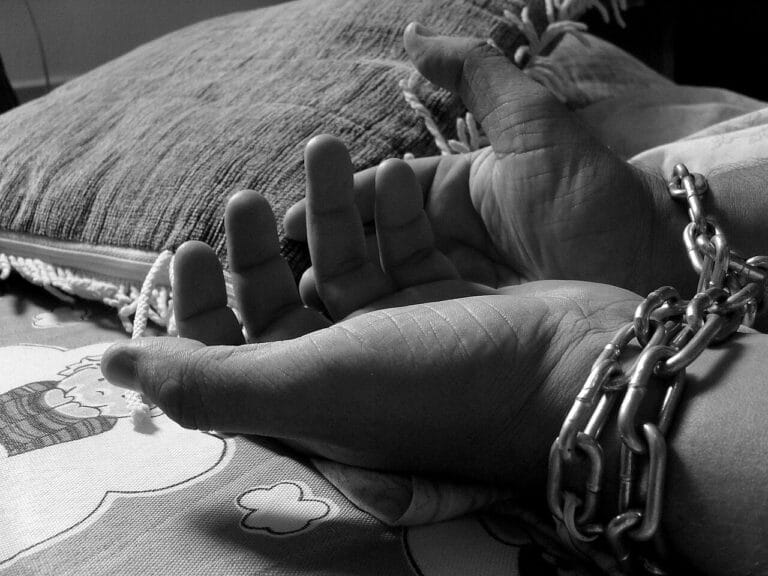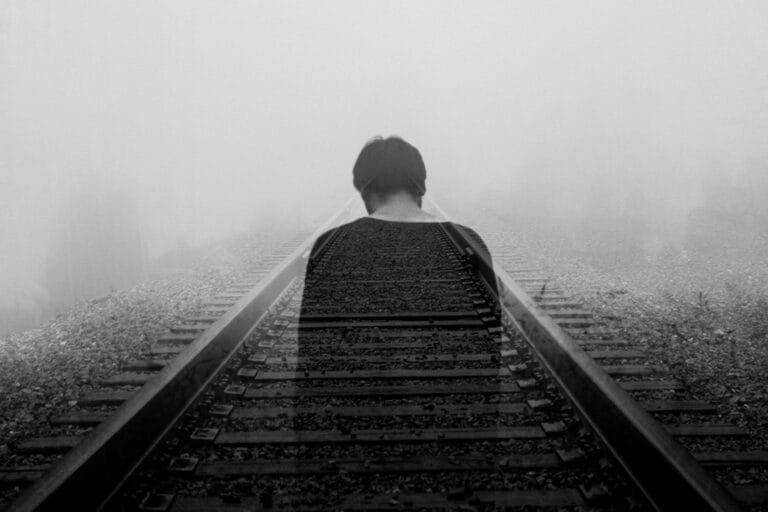Scripture Focus: Romans 3:23, Romans 6:23, Isaiah 53:6
Have you ever wondered why every human culture throughout history has had some concept of rescue, redemption, or salvation? From ancient mythologies to modern superhero movies, we’re drawn to stories of someone swooping in to save the day when all hope seems lost. But what if I told you this universal longing points to a deeper truth about the human condition?
The uncomfortable reality that many refuse to face is this: we’re all in desperate need of rescue. Not from external circumstances, natural disasters, or even other people. – but from something far more dangerous and devastating. We need salvation from ourselves, from our sin, and from the eternal consequences that sin brings.
This isn’t popular teaching in our self-help, pull-yourself-up-by-your-bootstraps culture. We prefer messages that affirm our inherent goodness and our ability to overcome any obstacle through positive thinking and hard work. But Scripture paints a radically different picture of the human condition – one that’s simultaneously more sobering and more hopeful than anything our culture offers.
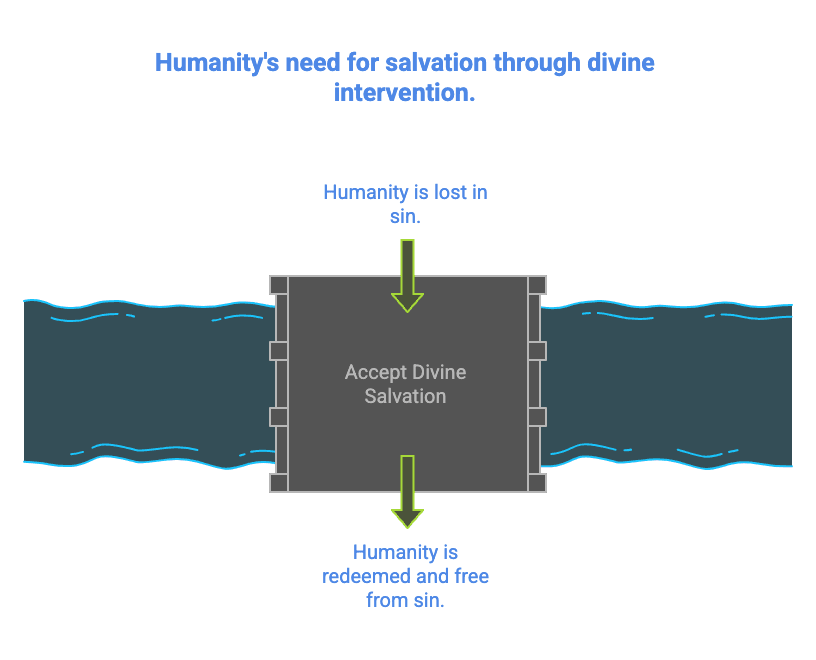
The Perfect Beginning That Went Wrong
Let’s start where the story really begins, in the Garden of Eden. Let look at – Adam [Man/Mankind] and Eve [Living] walking with the Creator of the universe in the cool of the day. No shame, no fear, no separation. Can you imagine it? Perfect communion with the God who spoke galaxies into existence, who counts every star and calls them by name.
Genesis 2:25 tells us they were “naked and not ashamed.” This wasn’t just about physical nakedness,it was about complete openness, transparency, and perfect relationship with each other and with God. They had everything! Perfect bodies, perfect minds, perfect hearts, and most importantly, perfect fellowship with their Creator.
But then came Genesis 3. The serpent slithered into paradise with a simple question: “Has God indeed said…?” Doubt. Questioning God’s word. Questioning God’s goodness. And in that moment, everything changed.
When Adam and Eve ate from the tree of the knowledge of good and evil, sin entered the world like a deadly virus. Suddenly, for the first time in human history, man was afraid of God. Genesis 3:8 breaks my heart every time I read it: “And they heard the sound of the Lord God walking in the garden in the cool of the day, and the man and his wife hid themselves from the presence of the Lord God among the trees of the garden.”
They hid! From the God who loved them, who created them for fellowship with Him. Sin had built a wall between God and man that humanity could never tear down on its own.
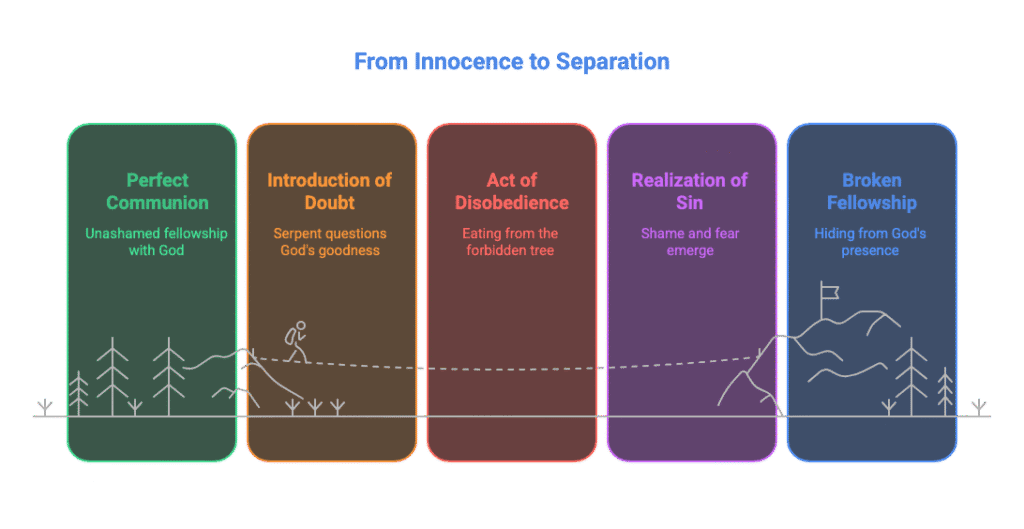
The Disease That Infected Us All
Here’s the truth that our world desperately tries to avoid: Adam and Eve’s problem became our problem. This wasn’t just an ancient couple making a bad choice in a garden. This was the fall of all humanity.
Romans 5:12 explains it clearly: “Therefore, just as sin came into the world through one man, and death through sin, and so death spread to all men because all sinned.” We didn’t just inherit Adam’s DNA—we inherited his sin nature.
You see, brothers and sisters, we don’t become sinners because we sin. We sin because we are sinners. It’s our nature. From the moment we’re born, we have hearts that naturally rebel against God. You don’t have to teach a child to be selfish, to lie, to disobey. It comes naturally because we’re born with a sin nature.
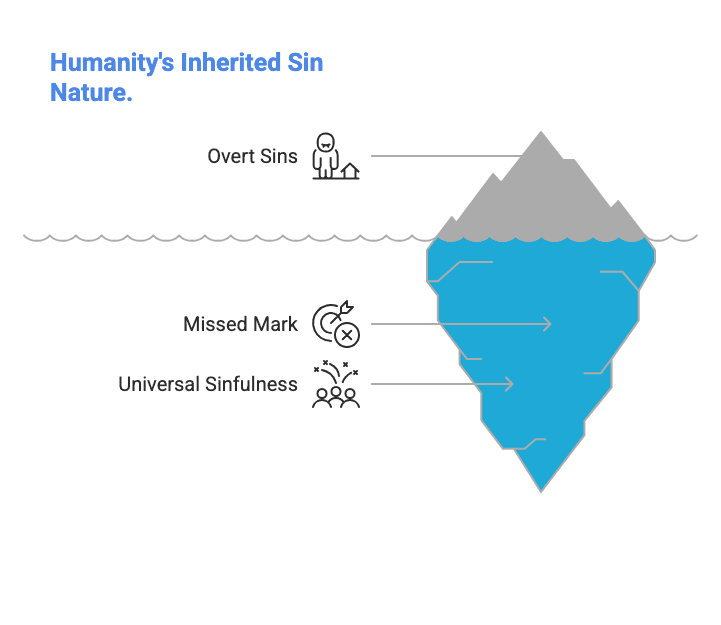
Romans 3:23 delivers the diagnosis that every human being must face: “For all have sinned and fall short of the glory of God.” Not some people. Not most people. ALL people. The morally upright person, the religious person, the kind grandmother who never hurt a fly, the generous philanthropist, all have sinned and fallen short.
But let me be even more specific about what this means. The word “sin” in the original Greek is “hamartia” [ἁμαρτία], which literally means “to miss the mark.” It’s an archery term describing an arrow that doesn’t hit the bullseye. God’s standard is perfect righteousness, absolute moral perfection. And every single human being who has ever lived (except Jesus) has missed that mark completely.
Isaiah understood this when he was given a vision of God’s holiness in Isaiah 6:5. His response? “Woe is me! For I am lost; for I am a man of unclean lips, and I dwell in the midst of a people of unclean lips; for my eyes have seen the King, the Lord of hosts!” Isaiah was one of the most righteous men of his generation, but in the presence of absolute holiness, he saw his own sinfulness clearly.
The Scattering That Describes Our Condition
Isaiah 53:6 paints the most accurate picture of the human condition: “All we like sheep have gone astray; we have turned—every one—to his own way; and the Lord has laid on him the iniquity of us all.”
This isn’t just poetic language, it’s a precise diagnosis. Like sheep, we’ve all gone astray. We’re not just lost; we’re actively running in the wrong direction. Every single person has “turned to his own way” instead of God’s way. We’ve made ourselves the center of our own universe instead of acknowledging God as the rightful King.
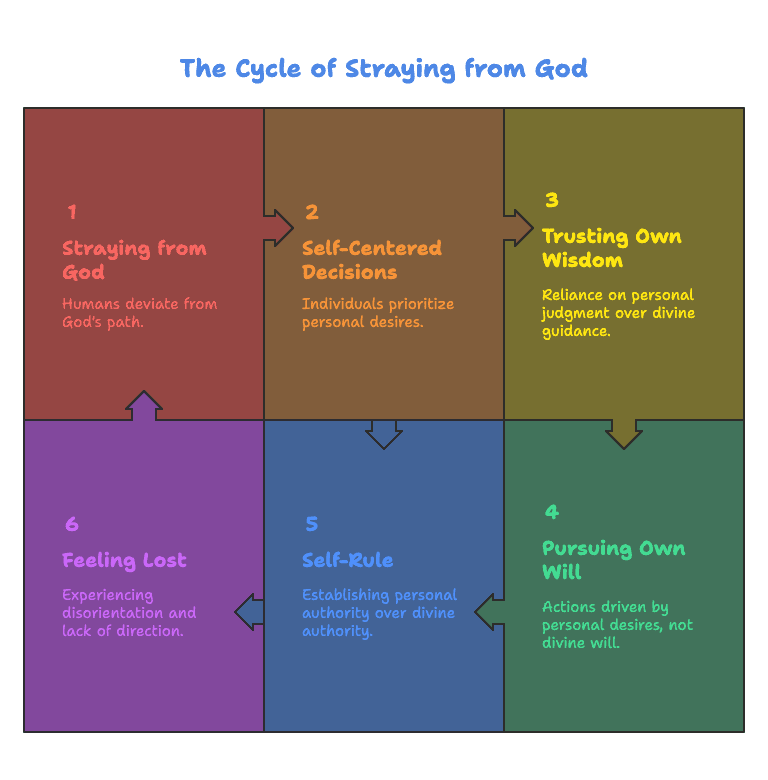
Think about it honestly for a moment. How many of your decisions in life have been made with the primary question, “What does God want me to do?” versus “What do I want to do?” We naturally choose our way over God’s way. We trust our wisdom over His wisdom. We pursue our will over His will. This is what sin looks like at its core—self-rule instead of God’s rule.
The Hebrew word used here for “astray” is “ta’ah” [תָּעָה], which means to wander, to err, to go astray. It’s the same word used to describe someone who has lost their way in the wilderness. Without a guide, without a map, without hope of finding their way home. That’s the human condition apart from God.
The Separation That Breaks God’s Heart
Sin doesn’t just make us imperfect—it separates us from God. Isaiah 59:2 explains: “But your iniquities have made a separation between you and your God, and your sins have hidden his face from you so that he does not hear.”
This separation is the deepest tragedy of the human condition. We were created for fellowship with God, but sin has built a wall between us and our Creator. God is perfectly holy, and sin cannot exist in His presence. It’s not that God doesn’t want to be close to us—it’s that His perfect holiness and our sinfulness cannot coexist.
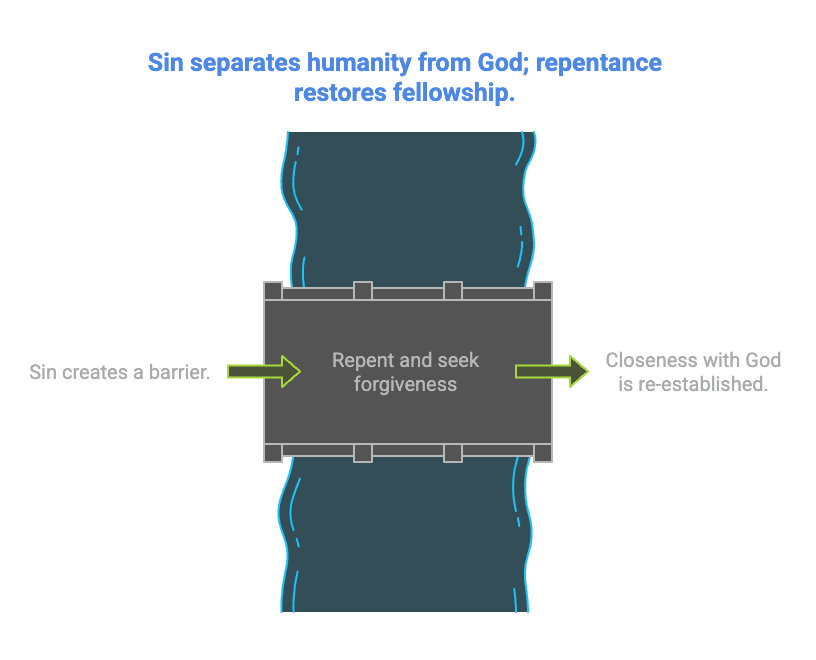
Imagine a perfectly clean white garment. Now imagine trying to use it to clean up motor oil. The garment would be ruined, stained beyond recognition. In a similar way, our sin makes us incompatible with God’s perfect holiness. We can’t clean ourselves up enough to bridge that gap.
Habakkuk 1:13 tells us that God’s “eyes are too pure to look on evil; you cannot tolerate wrongdoing.” This isn’t cruelty—it’s the nature of perfect holiness. Light and darkness cannot coexist. Purity and corruption cannot occupy the same space.
The Wage That We’ve All Earned
Romans 6:23 reveals the devastating consequence of our sin: “For the wages of sin is death, but the free gift of God is eternal life in Christ Jesus our Lord.” The word “wages” here is significant. Wages are what you earn, what you deserve for your work. Death is what we’ve earned through our sin.
But this isn’t just talking about physical death. The Bible speaks of three kinds of death that result from sin:
- Physical Death – Every person dies because sin has corrupted creation itself. Death entered the world through sin (Romans 5:12), and now every human being faces the reality of physical death.
- Spiritual Death – This is being separated from God, dead to spiritual things. Ephesians 2:1 describes our condition before salvation: “And you were dead in the trespasses and sins.” We may be alive physically, but spiritually we’re dead—unable to see, understand, or respond to spiritual truth.
- Eternal Death – This is the second death spoken of in Revelation 20:14, eternal separation from God in hell. This isn’t just the absence of God’s blessings—it’s the conscious, eternal experience of His wrath against sin.
The most terrifying aspect of our condition is that we’re born spiritually dead. We don’t become spiritually dead when we sin—we’re born that way because we’re born with a sin nature. 1 Corinthians 2:14 explains: “The natural person does not accept the things of the Spirit of God, for they are folly to him, and he is not able to understand them because they are spiritually discerned.”
Our Complete Inability to Save Ourselves
This is where the gospel becomes so beautiful, brothers and sisters. We need to understand how hopeless our situation is before we can appreciate how amazing God’s solution is.
Jeremiah 13:23 asks the rhetorical question: “Can the Ethiopian change his skin or the leopard his spots? Then also you can do good who are accustomed to do evil.” The answer is obvious—no! A leopard cannot change its spots, and we cannot change our sin nature through willpower, good works, or religious effort.
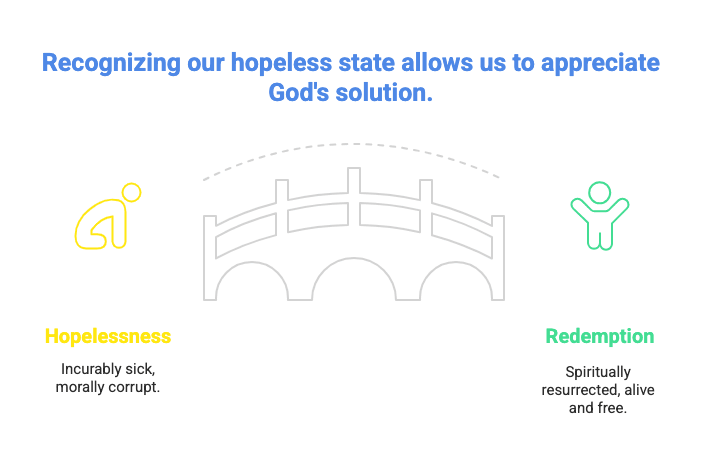
Jeremiah 17:9 gives us God’s diagnosis of the human heart: “The heart is deceitful above all things, and desperately sick; who can understand it?” The word “desperately sick” in Hebrew is “anash” [אָנַשׁ], which means incurably sick, morally corrupt beyond remedy.
We’re not just slightly wounded soldiers who need a little help getting back on our feet. We’re dead men who need resurrection. We’re not drowning and need someone to throw us a life preserver. We’ve already drowned and sunk to the bottom, and we need someone to dive down, bring us back to the surface, and breathe life back into our lungs.
The Impossibility of Self-Redemption
The religious mind always wants to contribute something to salvation. “Surely there’s something I can do! Some good work, some religious ritual, some moral improvement that will help bridge the gap!” But Isaiah 64:6 crushes that hope: “We have all become like one who is unclean, and all our righteous deeds are like a polluted garment.”
The phrase “polluted garment” is actually much stronger in the original Hebrew. It refers to menstrual rags—the most unclean thing in ancient Jewish culture. God is saying that even our very best efforts, our most noble deeds, our greatest acts of righteousness are like filthy rags in comparison to His perfect holiness.
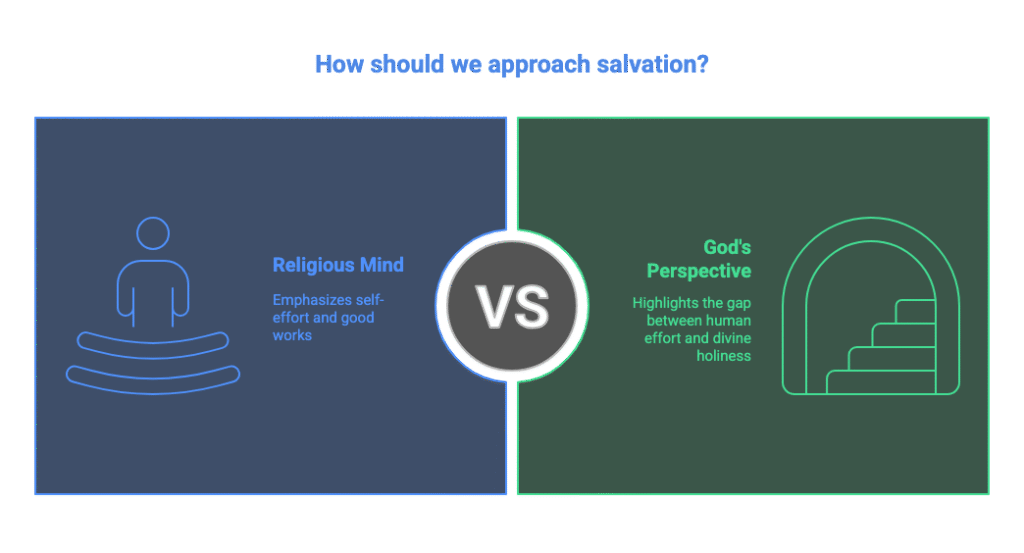
This isn’t God being mean—it’s God being honest about the gap between His standard and our performance. No amount of good works can bridge the infinite gap between our sinfulness and His holiness.
The Beautiful Truth of Our Desperate Need
Brothers and sisters, here’s why understanding our desperate need for salvation is actually the most hopeful truth in the world: it’s the foundation for understanding God’s incredible grace!
You see, if we were just slightly sick, we’d need a doctor. If we were just slightly lost, we’d need directions. If we were just slightly dirty, we’d need a bath. But because we’re dead in our trespasses and sins, because we’re completely lost, because we’re stained beyond our ability to clean ourselves—we need a miracle. We need someone to do for us what we cannot do for ourselves.
And that’s exactly what God did! While we were still sinners, Christ died for us (Romans 5:8). While we were still His enemies, He reconciled us to Himself (Romans 5:10). While we were dead in our trespasses, He made us alive together with Christ (Ephesians 2:5).
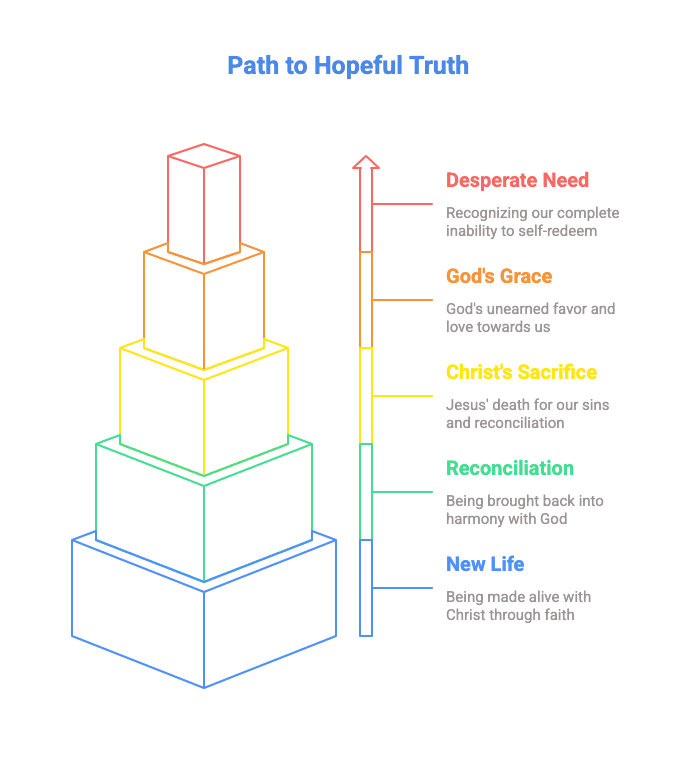
The Wonder of Why This Matters
Understanding our need for salvation changes everything:
- It humbles us – We can’t boast about our salvation because it’s entirely God’s work, not ours.
- It amazes us – The deeper we understand our sin, the more amazing God’s grace becomes.
- It unites us – We’re all in the same boat. No one is better than anyone else. We all desperately need the same Savior.
- It motivates us – When we truly grasp what we’ve been saved from, we can’t help but share this good news with others.
Brothers and sisters, we don’t need salvation because we’ve made some mistakes. We don’t need salvation because we’ve had some bad days. We need salvation because we’re dead in our trespasses and sins, separated from a holy God, under His wrath, and completely unable to save ourselves.
But praise God, this is not where the story ends! Our desperate need is the dark backdrop that makes God’s amazing grace shine all the brighter. In our next study, we’ll explore how God provided the solution to our impossible problem through His Son, Jesus Christ.
Until then, let this truth settle deep into your heart: you need a Savior. Not because you’re terrible, but because you’re human. And the God who created you for fellowship with Himself loves you too much to leave you in your sin.
He has made a way where there was no way. He has provided hope where there was no hope. He has offered life where there was only death.That, brothers and sisters, is why we all need a Savior. And praise God, we have one in Jesus Christ our Lord!

John Thole is the voice behind Beyond Salvation, a blog that captures the highs and lows of life through faith, laughter, and honest reflection. With a passion for storytelling, technology, and spiritual growth, he creates content that resonates with seekers, believers, and anyone navigating life’s journey. Whether sharing personal insights, devotionals, or thought-provoking discussions, John aims to inspire, uplift, and spark meaningful conversations.
